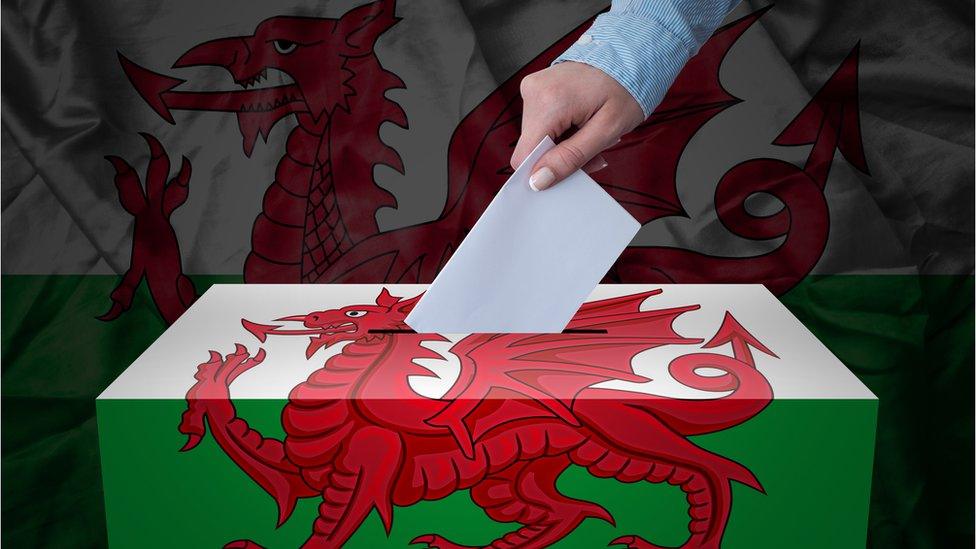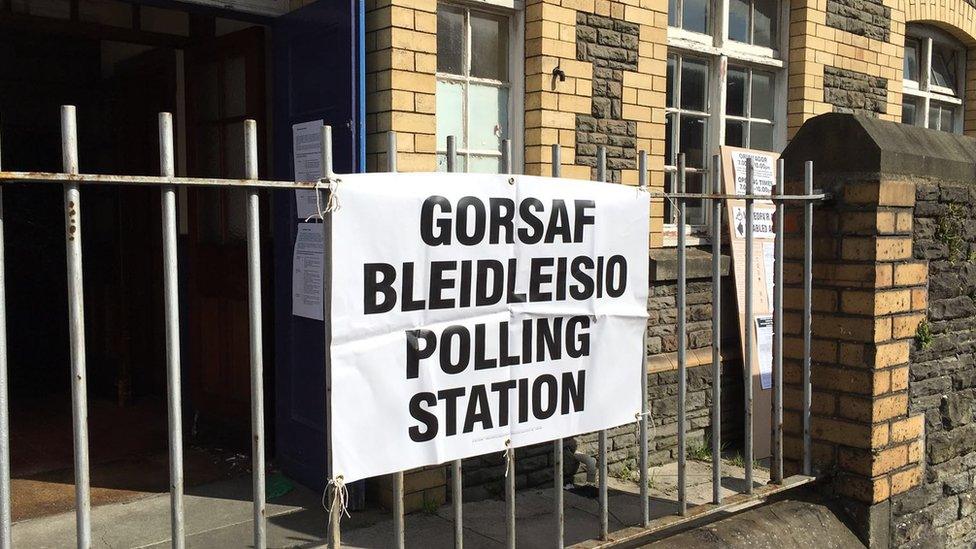Wales elections: Automatic voter registration on cards
- Published
- comments

Councils in Wales could add the names of anyone who is eligible to the electoral register
People could be automatically registered to vote in Welsh elections as a way to increase turnout.
The Welsh government said voting should be made as simple as possible, especially for young people.
More information about candidates and parties and better equipment for disabled voters could also be introduced.
The proposals to reform Senedd and local council elections are being set out in a white paper.
It would not affect elections for MPs, which are decided in Westminster.
The Welsh Conservatives said automatic registration for Senedd and council elections, but not others, could confuse voters.
Only people who have registered to vote can cast a ballot. Under the proposals, councils could add the names of anyone who is eligible to the electoral register.
There is no date for the proposals to become law - the white paper said ministers want to work with councils to run a series of automatic registration pilots.
The Welsh government is also looking for ideas to encourage more young people and students to register and vote.
Since 2021, the voting age for Senedd and Welsh local elections has been lowered to 16.
But the Electoral Commission said only one in five newly enfranchised 16 and 17-year-olds registered to vote ahead of May's local elections. Turnout was lowest among younger age groups, it said.
The Welsh government proposals say universities could share data with councils so students are registered when they enrol.

Student Eleri Thomas said automatic registration would be a "lot easier"
'It's really important for people to vote'
Swansea University student Eleri Thomas, 19, said she thought reforms could be a good thing.
Automatic registration, she said "would be a lot easier" and "more beneficial because you don't have to go out of your way to do anything".
Medical student Elliott Hulme, 26, said the current registration process "is fine but there's lots of things to be worrying about when you first come to university and it's an extra form that needs filling out".
"That's maybe not what your priority is," she explained.
Niamh Goodwin-Thomas, 24, said registering "is easy" but the easier the process is the better.
'I think it's really important for people to vote, especially now because of what's going on and how it impacts your day-to-day life. I don't think people realise how much it does," the medical student added.

In some areas at last May's council elections people were able to cast their ballots before voting day, in an attempt to increase turnout
Welsh Conservative spokesman on the constitution Darren Millar said it was not clear why the changes were necessary.
"Registering to vote is already simple," he said.
"Any changes to the voting system which apply only to some elections and not others will cause unnecessary confusion.
"Automatic registration for Senedd and local elections could lead to voters incorrectly assuming they are registered to vote in all elections and cause them to miss out on voting.
"Worse still, automatic enrolment of people who move home or students at university could increase the risk of people being registered in two places and voting twice."
Plaid Cymru's Sioned Williams said: "As with the extension of voting rights to 16 and 17-year-olds, people will not be empowered to vote unless they are inspired to vote.
"Indeed, unless you vote at a young age you are less likely to vote in the future, so, while I welcome this move by Welsh Government to pilot the automatic registration of voters, it must go hand in hand with measures to increase the numbers of voters beyond those included in the new curriculum - which of course will be too late for a whole cohort of learners and those who have already left school.
"We need to see political education both in educational and community settings as automatically registering a person to vote will not increase voter engagement unless they are first fully informed and engaged with the democratic process."
'Unintended consequence'
Peter Stanyon, chief executive of the Association of Electoral Administrators, said it was generally supportive of measures to modernise registration, but warned of the potential for "voter confusion" and the "unintended consequence of hindering participation in elections".
He said electoral administrators were already preparing for changes to Westminster elections, which will require voters to present identification at polling stations from May 2023. Voter ID is not planned for other Welsh polls.
"At present police and crime commissioner polls can be combined with Senedd and Welsh council elections, and UK parliamentary with council polls. Given the challenges the differences in voting franchise and more would bring, we question whether these combinations should continue."
The white paper also confirms the Welsh government will not imminently attempt to revive plans to give some prisoners the vote, which had been shelved during the early part of the Covid pandemic.
While it said the plan "remains a priority", it added that the UK government's opposition "makes further progress challenging".
"We have decided not to include this in our immediate reform programme but will continue to consider it as a longer-term priority," the white paper added.
'Easy as possible'
Counsel General Mick Antoniw, the Welsh government's constitution minister, said: "This is another step in improving the accessibility of Welsh elections.
"We want it to be as easy as possible to vote, with people able to play their full part in our democracy."
Local authorities will be invited to take part in a trial run.
It follows an early voting pilot project at May's local elections, where people in Blaenau Gwent, Caerphilly, Torfaen and some parts of Bridgend were able to cast their vote ahead of polling day.
But a report by the Electoral Commission found few people took advantage of the scheme.
At the time, the Conservatives said the £1.5m spent on the project had been wasted but ministers defended the trials.

FIGHT FOR YOUR RIGHTS: The Welsh consumer show fighting for YOUR rights

Related topics
- Published29 April 2022

- Published6 May 2022

- Published6 May 2022

- Published2 August 2022
